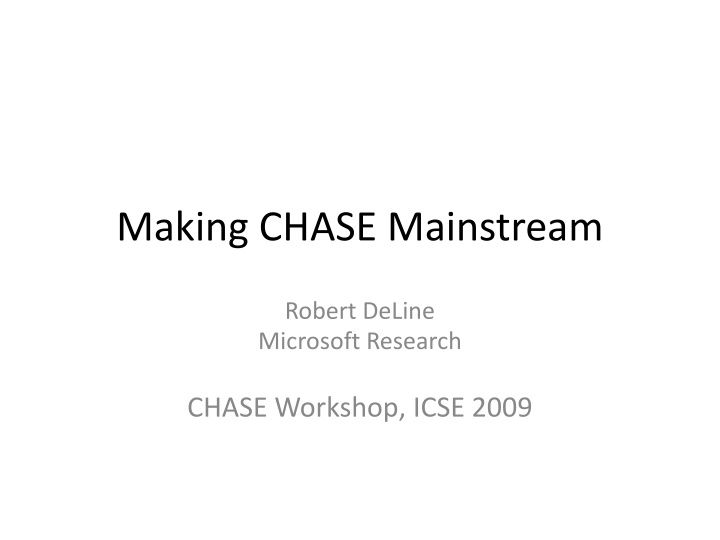
Core of Software Development through CHASE Studies
This collection delves into the essence of software development through the lens of CHASE studies, focusing on the intricate dynamics that shape the collaborative creation of software. Explore the importance of user needs, design rationale, enabling conditions for mainstream adoption, and the nuances of studying development teams and repositories. Discover how CHASE uncovers the human element in software development that cannot be abstracted away, shedding light on critical aspects of the process.
Download Presentation

Please find below an Image/Link to download the presentation.
The content on the website is provided AS IS for your information and personal use only. It may not be sold, licensed, or shared on other websites without obtaining consent from the author. If you encounter any issues during the download, it is possible that the publisher has removed the file from their server.
You are allowed to download the files provided on this website for personal or commercial use, subject to the condition that they are used lawfully. All files are the property of their respective owners.
The content on the website is provided AS IS for your information and personal use only. It may not be sold, licensed, or shared on other websites without obtaining consent from the author.
E N D
Presentation Transcript
Making CHASE Mainstream Robert DeLine Microsoft Research CHASE Workshop, ICSE 2009
What is CHASE? CHASE studies software development as though software were created by people working together. CHASE studies those aspects of software development about which people cannot be usefully abstracted away.
user needs design rationale People and their Roles test spec pm customers dev
user needs design rationale test spec pm dev
user needs design rationale program understanding visualization information seeking knowledge sharing interruption + multitasking bug assignment onboarding test spec pm dev
user needs design rationale program understanding visualization information seeking knowledge sharing bug assignment interruption + multitasking onboarding test spec pm dev
user needs design rationale program understanding visualization information seeking knowledge sharing awareness coordination social networking expert finding bug repro + diagnostics workflow + productivity bug assignment interruption + multitasking onboarding distributed work operations
Enabling conditions for mainstream Need big open problems Need adoption paths for practitioners Research methods need to scale out to many researchers Need to build bridges to established SE research areas Java, Eclipse, Bugzilla, CVS, Mylyn
Studying development teams Research repositories archive raw data reuse across studies Archaeology data mining modeling The direct approach surveys interviews observations Boundaries Precision Accuracy? Boundaries Data fitness Boundaries Overfishing
Example: Ko et al ICSE 07 transcripts What code caused this program state? Why was the code implemented this way? In what situations does this failure occur? What code could have caused this behavior? How have the resources I depend on changed? What is the program supposed to do? What have my coworkers been doing? 61% unsatisfied, max 21 min 44%, 21 min 41%, 49 min 36%, 17 min 24%, 9 min 15%, 21 min 14%, 11 min
An execution route finder Intended usage scenario Select starting and ending lines of code Step through the execution, like in a debugger Drag the route to change the execution path Code Canvas is the front end Has layers for displaying trace and program state Zooms from system architecture down to code Pex is the back end Systematically explores execution traces Uses symbolic reasoning to find new paths Uses dynamic analysis to avoid decidability limits Can repro a complete execution trace
Enabling conditions for mainstream Need big open problems Need adoption paths for practitioners Research methods need to scale out to many researchers Need to build bridges to established SE research areas WHAT ELSE?
Software Engineering Research GOALS METHODS EVALUATIONS IMPROVE QUALITY Find defects in designs Find defects in code Promote architectures/designs Improve performance Allocate test resources Isolate defects Eliminate sources of defects prog. lang. design type systems theorem proving spec. notations modeling notations static analysis dynamic analysis code optimization runtime optimization data mining statistical models process improvement design/arch. notations architectural design system design dev. tool design dev. environment design pattern languages visualization theory building formal theorems case studies on specs/code benchmarks demonstrations/prototypes case studies on team artifacts case studies on teams controlled experiments IMPROVE FUNCTIONALITY Find defects in specs Improve reqts gathering Improve bug tracking IMPROVE TIME TO MARKET Reuse components Reuse design patterns Improve cost estimation Improve productivity Improve code understanding Spread team knowledge Improve coordination
